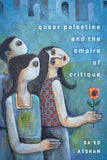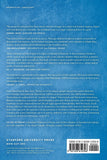Queer Palestine and the Empire of Critique
From Ramallah to New York, Tel Aviv to Porto Alegre, people around the world celebrate a formidable, transnational Palestinian LGBTQ social movement. Solidarity with Palestinians has become a salient domain of global queer politics. Yet LGBTQ Palestinians, even as they fight patriarchy and imperialism, are themselves subjected to an "empire of critique" from Israeli and Palestinian institutions, Western academics, journalists and filmmakers, and even fellow activists. Such global criticism has limited growth and led to an emphasis within the movement on anti-imperialism over the struggle against homophobia.
With this book, Sa'ed Atshan asks how transnational progressive social movements can balance struggles for liberation along more than one axis. He explores critical junctures in the history of Palestinian LGBTQ activism, revealing the queer Palestinian spirit of agency, defiance, and creativity, in the face of daunting pressures and forces working to constrict it. Queer Palestine and the Empire of Critique explores the necessity of connecting the struggles for Palestinian freedom with the struggle against homophobia.
Reviews
"This utterly brilliant book will be a classic. Sa'ed Atshan's comprehensive study of queer Palestinian activism provides a rich understanding of the complex intersections of selfhood, activism, and belonging. By demonstrating the limits of binarisms of East/West and self/other through detailed empirical analysis and powerful theoretical interventions, Atshan has given us a landmark work valuable to Middle East studies, queer studies, and anthropology in the broadest sense."―Tom Boellstorff, University of California, Irvine, author of The Gay Archipelago: Sexuality and Nation in Indonesia
"Queer Palestine and the Empire of Critique is a breath of fresh air! In the academic climate in which 'radical' has become synonymous with crude schisms between West and East, authentic and inauthentic, pure and sellout, this book provides a much-needed nuanced account of Queer Palestine. Sa'ed Atshan carefully historicizes the local terrain and rightly problematizes how US-based scholarship has turned the critique of empire into an empire of critique. This is a brilliant call for academic self-reflection and a brave rejection of so-called radical myths of cultural authenticity."―Gil Z. Hochberg, Columbia University
"Sa'ed Atshan brilliantly weaves together ethnography and personal experience in the most thoughtful, engaging, and emotionally captivating ways. His sophisticated work captures the nexus of a scholar-activist, offering an authoritative account of the challenges and trajectory of the Palestinian LGBTQ movement. A tour de force and a remarkable book for both its theoretical and empirical contributions."―Amaney A. Jamal, Princeton University
"This powerful and prophetic book shows that the struggle for justice and freedom against empire and homophobia are indivisible. Sa'ed Atshan's text is a major intellectual force for good."―Cornel West, Harvard University
"[A] timely and urgent account....Along with a succinct presentation of the immense challenges faced by the LGBTQ-identifying Palestinians, Atshan highlights Palestinian agency, ingenuity, and resilience."―Joshua Donova, New Books Network
"[Atshan] immaculately illustrates the development of movements along with the challenges they face by both conservative Palestinians and Arabs at large and by the repressive occupation. This work is pioneering and fills a significant gap within Middle East Studies."―Lana Shehadeh, Arab Studies Quarterly
"Queer Palestine and the Empire of Critique is a much-needed contribution to queer studies, Middle East studies, and scholarship on social movements and a must-read for those who are committed to the difficult politics of solidarity."―Evren Savci, Journal of Middle East Women's Studies
"This is a most timely and admirably courageous book that challenges the seeming gap between queer activism and anthropology...Atshan shows that anthropology has the potential to support local activist struggles against homophobia and imperialism by rigorously engaging with, rather than dismissing, the experiences and views of these activists―their simultaneous engagement with multiple axes of oppression."―2021 Ruth Benedict Book Prize Committee, Association for Queer Anthropology
"Atshan makes a major contribution to the study of social movements generally and the queer Palestinian movement specifically. Atshan conceptually explores resistance and identity in the context of Israeli and Palestinian conflict. He offers an empirically rich and compelling account, where readers are let into the everyday life of the global queer Palestinian solidarity movement."―Sara Salman, Contemporary Sociology
"The nature of life under colonisation and occupation, in Atshan's view, means that no one, not even 'the most radical activists and academics', can lay claim to the moral high ground. Everyone is implicated in some way. It's better to edge forward in modest ways."―Tareq Baconi, London Review of Books
"Atshan's work is candid, self-critical, and unexpectedly inspiring."―Lisa Anderson, Foreign Affairs
"[Atshan's] book is the culmination, at least for now, of his years-long effort to persuade his activist community to simultaneously oppose Israeli rule and Palestinian homophobia, and not privilege the one over the other... Atshan's book is a trenchant clarion call, harnessed to the words of the iconic African American poet Audre Lorde: 'there is no hierarchy of oppressions.'"―Abe Silberstein, The Tel Aviv Review of Books









